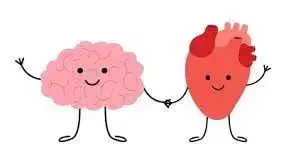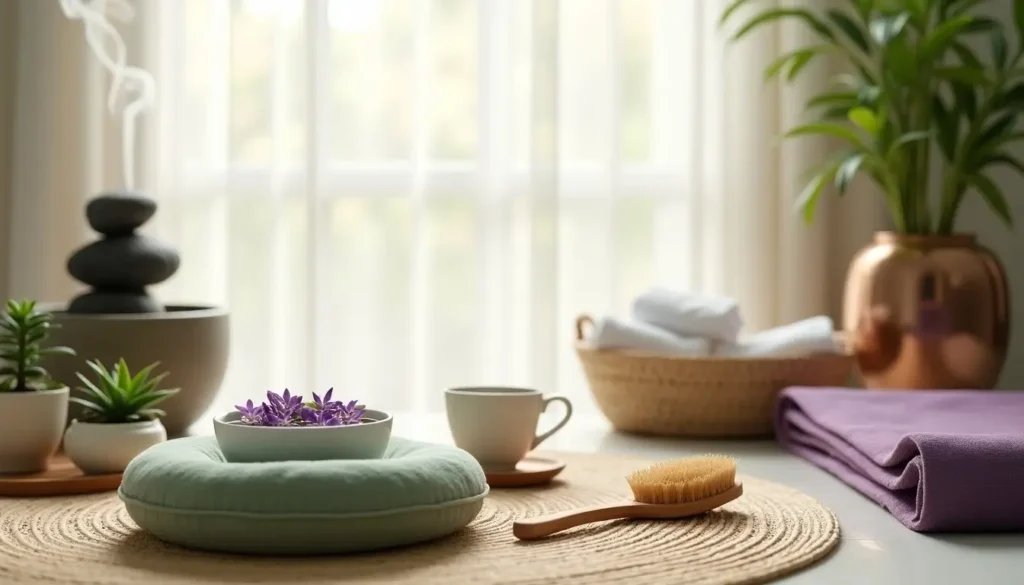Burnout runs rampant in today’s world. Many of us still find it hard to put our wellbeing first. Self-care gets talked about everywhere, but people often think it’s just about bubble baths and spa days.
Let me paint a clearer picture of self-care. My research and personal journey show it’s much more than occasional treats. Self-care needs a detailed approach to keep our physical, mental, and emotional health in check. The reason it matters? Simple – it’s the foundation of our wellbeing. It affects how well we perform,
connect with others, and enjoy our daily lives.
As I wrote in this piece, we’ll look at the science behind self-care and find key practices that work in different parts of life. You’ll also learn ways to track your progress. This guide helps both newcomers and those looking to improve their existing routine. You’ll get practical strategies to build a more balanced life that meets your needs.
Understanding the Science of Self-Care
Let’s explore the fascinating science behind why self-care matters so much. The research I’ve studied extensively makes me excited to share how our daily self-care practices create profound changes in our body and mind
The Mind-Body Connection

Our mind and body share an intricate connection that forms a two-way relationship and influences our overall health. Our brain releases specific chemicals that flow throughout our body when we experience emotional events. These chemicals affect various physiological functions. This connection isn’t just theoretical – it’s a powerful force that can either improve or diminish our wellbeing.
Neurological Benefits of Self-Care
Self-care has remarkable effects on our brain. Research shows that regular self-care practices trigger the release of important neurotransmitters like serotonin and dopamine. The sort of thing I love is how meditation and other self-care activities can actually change our brain structure. Studies have revealed increased gray matter density in areas associated with memory, self-awareness, and compassion.
Here are some key neurological benefits I’ve found:
- Improved cognitive function and emotional resilience
- Better memory and self-awareness
- Better emotional regulation and stress management
Impact on Stress Hormones
Our brain releases cortisol when we’re stressed, acting as an alarm system for our body. This chemical can be triggered not just by immediate threats, but also by social isolation and anticipation of pain. My research shows that chronic stress can severely affect our health and lead to a weakened immune system and cardiovascular problems. The good news is that regular self-care routines in our daily lives can help us manage these stress hormones better, creating a calmer and more focused mind.
Core Pillars of Holistic Self-Care

My studies of self-care over the years have shown that wellness stands on three basic pillars that support our overall wellbeing. Let me share what I’ve learned about everything in this foundation for a balanced life.
Physical Wellness Practices
Physical self-care means more than just exercise and diet. Research shows that regular physical activity can prevent about 3.9 million premature deaths each year. My focus on physical wellness includes:
- Regular exercise (30 minutes daily works best)
- Balanced nutrition with whole foods
- Consistent sleep patterns
- Regular medical check-ups
Mental and Emotional Balance
My research shows that emotional regulation plays a vital part in our wellbeing. Studies indicate that holding back emotions can trigger anxiety, depression, and sleep problems. Mental and emotional balance needs active management of our thoughts and feelings. Stress makes emotional control harder, so I suggest daily mindfulness practices and regular emotional check-ins.
Social and Spiritual Connection
The sort of thing I love is how social connections shape our health. Research shows that social isolation raises the odds of premature death by 48%. People with at least three to five close friends feel less lonely and anxious.
Spiritual wellness doesn’t always mean religious practice – it’s about finding meaning and purpose in life. Meditation, nature walks, or community involvement help us connect with something bigger than ourselves. Studies show that warm social relationships predict happiness throughout our lives better than anything else.
Social connections need one to three hours of meaningful interaction daily. This might seem like a lot since most people socialize only 34 minutes each day. Even small increases in social time can improve our overall wellbeing significantly.
Transformative Self-Care Rituals
I’ve found that true self-care isn’t about occasional treats. It’s about building daily practices that support our wellbeing throughout the day. Let me share some effective rituals that work at different times.
Morning Energy Optimization

Your day’s tone depends on how you start it. Opening windows first thing can give you an amazing energy boost. Here’s my morning sequence that works:
- Hydrate right after waking up (this fights morning fatigue)
- Take 5 minutes for gratitude or visualization
- Do gentle stretches to get your blood flowing
Midday Reset Techniques
Energy levels often drop by midday, but some smart reset practices can keep you going. Studies show that mild dehydration can affect mood and make tasks harder to complete. A quick nature walk away from your desk sends productivity hormones like serotonin and dopamine to your brain. Your brain works best when you eat foods rich in omega-3 fatty acids and antioxidants.
Evening Wind-Down Practices
The science of evening routines is fascinating. Your body naturally gets sleepy when you take a warm bath at least an hour before bed. A consistent wind-down routine tells your brain it’s time to rest. Music helps you relax – any genre works as long as it calms you down.
These self-care rituals become powerful when you make them your own. Research confirms that self-care means listening to your body and paying attention to your thoughts. Different practices appeal to different people. You need to find what brings you joy and energy.
Note that these aren’t just treats – they’re purposeful practices that put self-nurturing first. These rituals build a foundation for better wellbeing and help you handle life’s challenges when you stick to them.
Measuring Self-Care Success
Tracking our self-care experience is a vital part of staying motivated and seeing real progress. My research and hands-on experience have taught me that wellness tracking goes beyond mere numbers. It paints a complete picture of our well-being.
Tracking Wellness Metrics
Successful self-care measurement needs us to watch several aspects of our daily lives. Research shows that various tools have been developed to measure self-care capabilities in healthy people and those with chronic conditions. The sort of thing i love is how tracking methods have moved from rehabilitation to prevention focus. These metrics deserve your attention:
- Sleep quality and patterns
- Physical activity levels
- Nutrition and hydration intake
- Stress levels and recovery time
Emotional Intelligence Indicators
Emotional intelligence is a vital component of self-care success. Studies show that emotional intelligence includes four areas: self-awareness, self-management, social awareness, and relationship management. Higher emotional intelligence associates with better self-care practices. Research confirms that people with greater emotional clarity and repair abilities experience lower stress levels.
Progress Assessment Tools
A detailed assessment helps measure progress effectively. Studies show that only five tools currently incorporate questions about all seven pillars of self-care. This suggests we need better ways to track our self-care experience. The seven pillars framework offers a well-laid-out approach to evaluation. It covers everything from health literacy to responsible product and service use.
Modern self-care assessment now favors self-reporting methods over traditional interviews. Regular reassessment matters because our self-care needs change with our situation. Consistent monitoring helps us spot areas that need attention and create focused improvement plans.
Note that perfection isn’t the goal – progress is. Measuring our self-care practices helps us understand what works and make smart adjustments to our routines.
Conclusion
Self-care goes nowhere near as simple as occasional pampering sessions. My research and experience show how purposeful self-care practices create measurable changes in our brain chemistry, emotional resilience, and physical health. Science supports what we naturally feel – taking care of ourselves helps us show up better for others and achieve more fulfilling lives.
Let’s take a closer look at self-care that shows success comes from balancing physical wellness, emotional health, and meaningful connections while tracking progress. Small, consistent actions make more impact than grand gestures. A morning gratitude practice or an afternoon walk can transform our entire day.
Self-care looks different for everyone. You should listen to your body, trust your instincts, and adjust your practices when needed. Start with one small change today and your future self will thank you for making self-care a priority.






